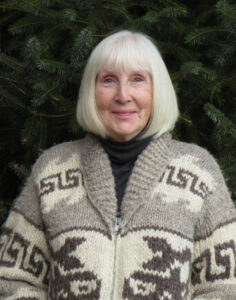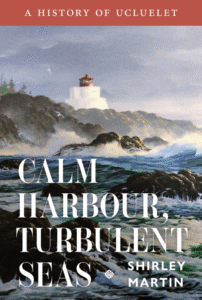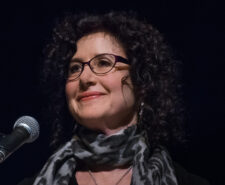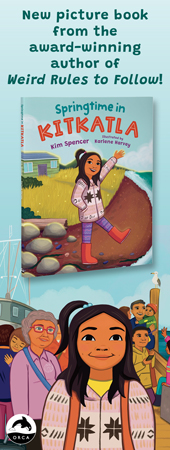A history of Ucluelet
August 13th, 2025

Shirley Martin’s Calm Harbour, Turbulent Seas: A History of Ucluelet (Harbour Publishing $39.95) is a comprehensive account of the coastal community’s past, weaving together stories of shipwrecks, sea serpents, settlement, dispossession and resilience. Beginning with histories shared by the local Yuułuʔiłʔatḥ and t̓uk̓ʷaaʔatḥ peoples, Martin charts Ucluelet’s transformation from an isolated outpost to a celebrated tourist destination. Alongside dramatic tales of lifeboat rescues and the building of Amphitrite Point Lighthouse, she captures the industries that shaped the town—fishing, logging and mining—and the shift toward tourism in the wake of the “War in the Woods.”
A fourth-generation resident, Martin grew up in Ucluelet when it was accessible only by sea or air, spending her childhood rowing her own small boat around the harbour and exploring the rugged shoreline. After earning an English degree from the University of Victoria and working in libraries, she returned home, where she continues to live and write. Her decades of research and interviews, combined with a personal connection to place, give the book both authority and warmth. An award-published poet and writer of both children’s and adult works, Martin remains deeply inspired by the West Coast’s natural beauty, finding in it both her subject and her muse.
*
Question: First of all, I really enjoyed reading your book. There are many layers to the history of Ucluelet and the west coast of Vancouver Island. What prompted you to write Calm Harbour, Turbulent Seas?
Answer: I grew up listening to stories told by my father and his siblings about their many adventures on the west coast. I was fascinated by the history and was always keen to learn more. There was an obvious gap on bookshelves holding books about the west coast, as there was no comprehensive book on the history of Ucluelet and surrounding areas. So I wrote one, not only to preserve the history but to share it with readers.
Q: Did you have a specific audience of readers in mind?
A: I wrote it for any and all readers. I wanted to honour those who lived the history or are descended from those who lived the history. I also know that many people who have moved to Ucluelet, or who visit here, do not know the history, and I hope they will find the book engaging and informative.
 Q: How did you choose the title of your book?
Q: How did you choose the title of your book?
A: I wanted a title that would reflect the nature of this place I call home. Calm Harbour, Turbulent Seas is a literal description of our physical surroundings, with the safe harbour of Ucluelet and the wild outer waters. The title is also metaphorical, with “turbulent seas” referencing such issues as the catastrophic damage caused by colonialism and by internment, and the stress and disruption affecting the area due to the decline of resource industries.
Q: The west coast of Vancouver Island is somewhat isolated geographically and has a remarkable history. As you say in the book, “the history of coastal First Nations goes back millennia. Carbon dating at an ancient village site on Benson Island in Barkley Sound shows people were living there five thousand years ago.”
A: I knew it was important to share the history of coastal First Nations, but was unsure about it, as I am a descendant of white settlers, and it is not my history to tell. But some First Nation Elders encouraged me and also vetted those sections of the book once I had completed the draft.
Ucluelet comes from the Yuułuʔił language which means “people of the safe harbour” in the Nuu-chah-nulth language and is the homeland of the Yuułuʔiłʔatḥ.
I am honoured to live and write on the traditional territory of the Yuułuʔiłʔatḥ and appreciative of the fact that I live on this safe harbour. This book is written with a respect for, and love of, place.
Q: The first explorers, the Spanish, arrived in the 1770s, so the settler history is relatively short by comparison with the Indigenous history. In the 250 years since then, life on the west coast of Vancouver Island has changed dramatically for the Indigenous society, with the banning of potlatches, introduction of the Indian Act, seizing land and more.
A: Colonialism was responsible for so much injustice. I have tried to educate myself with the facts about past injustices, present changes stemming from treaty negotiations, and hopes and plans for the future. As I state in the book, “As a descendant of settlers, it is not my right to assess the present standing of reconciliation.”
Q: Can you talk about the history of whaling on the west coast?
A: Whales are significant to Nuu-chah-nulth culture and were traditionally hunted by the Nuu-chah-nulth people for thousands of years. They did so sustainably. When the Europeans arrived, whaling became an enterprise, and numbers were soon decimated by European technology and attitudes. Ucluelet was not a whaling port, but whalers from sites such as the whaling station at Sechart in Barkley Sound often took shelter here. After whaling finally ended on the west coast, it took many years for whale populations to recover, and they are still at risk from human-caused dangers including vessel strikes, entanglement in fishing gear and toxic spills. Ucluelet is now a popular base for whale watching, but we must remain ever vigilant to protect these amazing mammals.
Q: Now to the “turbulent seas.” The western shores of Vancouver Island are part of the aptly named Graveyard of the Pacific, which has claimed over two thousand ships. Access to the port of Ucluelet was, and continues to be, challenging at times. Known as “safe harbour,” Ucluelet had many wrecks on her doorstep. Plenty of fishboats were lost over the years.
A: Shipwrecks make up a fascinating section of west coast history, and mariners must continue to navigate these waters with wariness and preparedness for rapidly changing conditions. As my father told me, “Always respect the ocean. Never turn your back on her.” It is also worthy of note that although Ucluelet is known as a safe harbour, we have had marine tragedies within the harbour limits.
Q: You have included so many interesting details: “The crew…made it to shore, where ‘they stood knee deep in periwinkles awaiting the rescuing party that was en route.’”
A: Rescues at sea were a common topic in the early Victoria newspapers, and I was enthralled with some of the descriptions the early reporters used when writing about west coast happenings.
Q: “When we camp kids reached school age, we walked…to the highway to catch the school bus. I remember the driver, Mr. Singleton, as a kind and patient man. By the time he reached us, the bus was loaded with high school students…and he’d
already dealt with his stress by pulling the bus over to the side of the road and getting out to have a smoke. (Some of the bigger kids joined him.)” Such a great image.
A: Throughout the book, I have included memories from my childhood, and trips on the school bus are still vivid in my mind. As I grew up in a logging camp outside town, bus trips were a regular occurrence. My childhood years out at Kennedy Lake logging camp were full of adventure, fun and some tragedy as well.
Q: This was a fascinating detail: “Barbara Touchie grew up close to the Japanese Canadian families at Hakoda Bay and played with the children there. They overcame language barriers by creating their own sign language.”
A: Many close friendships were forged, and it was devastating to members of all three communities (Japanese Canadians, white settlers, and First Nations) when the government forced the Japanese Canadians into internment camps.
Q: Another heartbreaking tale: “Some of the Japanese Canadian residents of Hakoda Bay buried items in their yards…Later on, when Barb was living in one of the cabins at Hakoda Bay, she heard a tinkling noise while hanging a picture on the wall. Her husband pulled some boards away, revealing a collection of teacups.”
A: When the Japanese Canadians were suddenly forced to leave, they had only forty-eight hours to prepare to travel and could only take what they could carry. They had to leave treasured belongings behind and sometimes hid items they hoped to reclaim when they returned. Sadly, the majority of the interned Japanese Canadians never returned to the west coast. Those who settled in Ucluelet after the war contributed greatly to the community.
Q: Logging, which began on the west coast in 1860, was in the forefront in the 1950s. It was still going strong in the 1980s and then became a hot-button political issue. The resultant dissension must have been difficult for all concerned.
A: What came to be known as the War in the Woods was a contentious time, fraught with conflict and stress. It resulted in MacMillan Bloedel pulling out of the area, creating big changes in Ucluelet. Unemployed loggers either left the area, retrained, or found work in the growing tourism industry.
Q: For centuries, the Pacific Ocean was bountiful, the fishing industry was huge, and there were canneries and fish plants up and down the west coast. The BC Trollers Association, at a three-day conference in 1936, advocated fish conservation. The impact of overfishing is not a recent thing!
A: This is true of all three of the industries I write about in my book. There were early proponents of conservation in mining, fishing and logging.
Q: The town of Ucluelet and its “calm harbour” has emerged in the twenty-first century as a beloved place and popular tourist destination. Some of the settler families have been there for many generations. It has a reputation as a chill west coast environment.
A: We truly have become well-known as a tourist destination. Tourism has been a boon to Ucluelet and area since the economy suffered badly after the downturn of logging and fishing. City people especially seem to enjoy the laid-back nature of our small town when they come to visit, although locals sometimes find tourist season noticeably hectic compared with years past.
Q: You have included so many fascinating details about the history and the people of this remote settlement. Was there anything you discovered that surprised you?
A: Although I knew that early city newspapers featured regular west coast happenings, I was surprised at how much detail they contained about west coast events, including those involving my own family.
Q: Did you experience any challenges during the writing of this book?
A: My greatest challenge was to keep the manuscript to a manageable size. I had so much information that I could have written a much longer book, but it was not feasible for the publication process. I therefore struggled with deciding what to cut. There are so many stories, and I wanted to share them all and give voice to the many individuals who made up Ucluelet’s past. 9781998526161


Shirley, your magic fingers and knowledgable mind are so evident in your book. I am very impressed, my friend with all the history, unknown to most of us and the heart warming memories of growing up in Ucluelet (and the logging camp). It is always good to go home to friends and family. Exceptional writing!
Great interview Shirley. I can think of no one better to have recorded the history of our little town. Looking forward to reading my copy of your book soon.